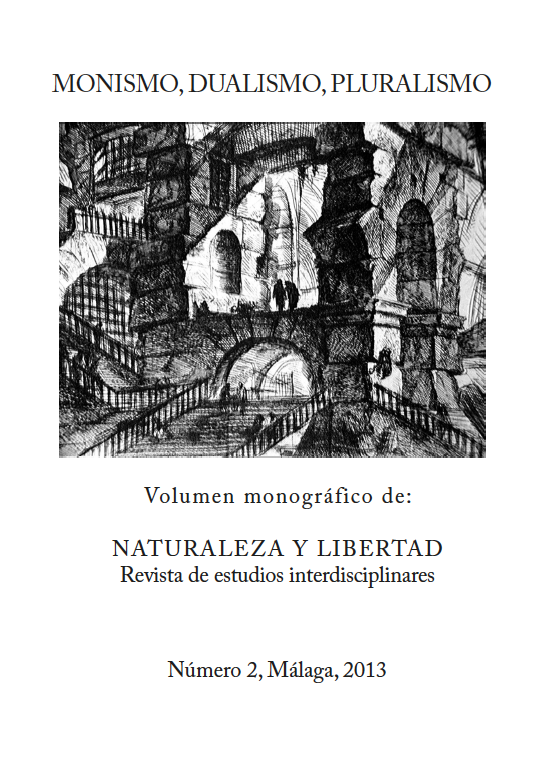Dos caras de la misma moneda: mente, materia y monismo neutral
DOI:
https://doi.org/10.24310/nyl.v2i1.3987Keywords:
Mente, materia, monismo neutral, percepción, estructura,Abstract
Resumen. Una de las más arraigadas tradiciones de la filosofía occidental distingue mente y materia como dos categorías contrapuestas de la realidad. Incluso cuando dichas categorías conceden preponderancia a una de ellas, sus identidades se mantienen netamente separadas. Por el contrario, el monismo neutral sostiene que esa distinción es engañosa y se basa en una visión de la naturaleza que los nuevos avances en microfísica y psicofisiología van disipando gradualmente. Mente y materia no serían más que dos acepciones para la misma realidad subyacente cuya estructura puede organizarse en dos modalidades alternativas.
Palabras clave: Mente, materia, monismo neutral, percepción, estructura.
Abstract: The most deeply rooted tradition in western philosophiy distinguishes mind and matter as two opposing categories of reality. Even when that tradition gives preponderance to one of them, their identities are always kept neatly separadas. By contrast, neutral monism contends that this difference is basicly misleading and is based on a view of nature that new developments in microphysics and psychophysiology are gradually dissipating. Mind and matter are no more than two meanings for the same underlying reality whose structure can be organized into two alternative modalities.
Keywords: Mind, matter, neutral monism, percepction, structure.
Recibido: 5/09/2012 Aprobado: 18/04/2013
Downloads
Metrics
References
Armstrong, D. M., A Materialist Theory of the Mind, New York, The Humanities Press, 1968.
Aune, B., Knowledge, Mind and Nature, New York, Random House, 1967.
Borst, C. V. (ed.), The Mind/Brain Identity Theory, London-New York, Macmillan-St. Martin's, 1970.
Chalmers, D., Philosophy of Mind. Classical and Contemporary Readings, New York, Ox¬ford University Press, 2002.
Feigl, H., “The Mind-Body Problem in the Development of Logical Empiricism”, en H. Feigl y M. Brodbeck (eds.), Readings in the Philosophy of Science, New York, Appleton-Cen¬tury-Crofts, 1953.
Feigl, H., The 'Mental' and the 'Physical'. The Essay and a Postscript, Minneapolis, Univer¬sity of Minnesota Press, 1967.
Hampshire, S. (ed.), Philosophy of Mind, London-NewYork, Harper and Row, 1966.
Hook, S. (ed.), Dimensions of Mind, New York, New York University Press, 1960.
James, W., Essays in Radical Empiricism, Lincoln, University of Nebraska Press, 1996.
Macdonald, C., Varieties of Things. Foundations of Contemporary Metaphysics, Oxford, Blackwell, 2005.
Mach, E., The Analysis of Sensations and the Relation of Physical to the Psychical, New York, Dover, 1959.
Mach, E., Knowledge and Error, Dordrecht, Reidel, 1976.
Russell, B., Human Knowledge, New York, Simon & Schuster, 1948.
Downloads
Published
How to Cite
Issue
Section
License
Those authors who have publications with this journal, accept the following terms:
1. Copyright and licensing information are clearly described on the journal’s web site: all content published in Naturaleza y Libertad is open acces without limit, and are subject to the Attribution-NonCommercial-ShareAlike 4.0 International (CC BY-NC-SA 4.0) license. The full text of which can be consulted at https://creativecommons.org/licenses/by-nc-sa/4.0/
2. It is the responsibility of the authors to obtain the necessary permissions for the images that are subject to copyright. The authors whose contributions are accepted for publication in this journal will retain the non-exclusive right to use their contributions for academic, research and educational purposes, including self-archiving or deposit in open access repositories of any kind. The electronic edition of this magazine is edited by the Editorial de la University of Malaga (UmaEditorial), being necessary to cite the origin in any partial or total reproduction.
3. This journal allows and encourages authors to publish papers on their personal websites or in institutional repositories, both before and after their publication in this journal, as long as they provide bibliographic information that accredits, if applicable, your posting on it.
4. In no case will anonymous papers be published.





18.png)













